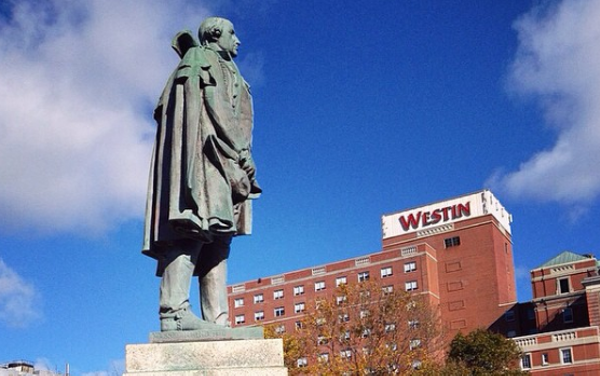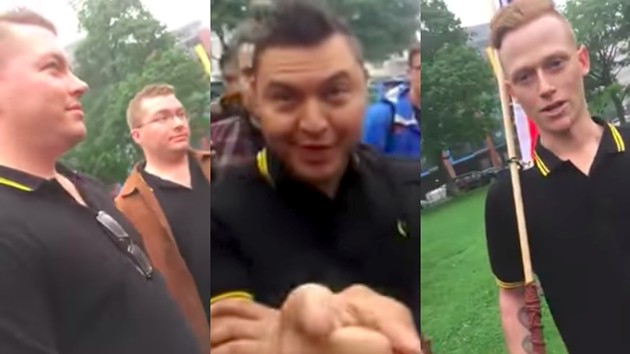
via edwardcornwallis_wanted on Instagram
This statue of Edward Cornwallis stands in front of the Westin hotel in Halifax's south end.
Mayor Mike Savage says both he and the Nova Scotia Assembly of Mi’kmaq Chiefs are against a protest planned to topple the statue of Edward Cornwallis.
“If Mi’kmaq activists and their supporters take down the Cornwallis statue before we are given an opportunity to cooperatively forge a better way forward, we will set back progress that is already being made,” Savage writes in a press release.
Although the Assembly of Chiefs hasn't issued its own statement, the mayor's office says it reached out to the group and the provincial
Created by a grassroots group of Indigenous women, the protest is inviting people of all races and nationalities to gather this Saturday at noon in Cornwallis Park in hopes of bringing down the bronze statue of Halifax’s controversial founder.
“To have a symbolic structure that has committed genocidal atrocities, it begs the question: What is Halifax looking to represent?” she asks. “How can we reconcile with a government structure that refuses to acknowledge this man committed genocide against our people?”
Savage disagrees with that assessment.
“I am committed to furthering our relationship with the Mi’kmaq of Nova Scotia, as is our council, which is why we adopted a Statement of Reconciliation,” the mayor states. “I believe it is crucial for all citizens of HRM that we have a new relationship, and as
The J. Massey Rhind sculpture of Edward Cornwallis was unveiled in 1931. Over the past few
Halifax Regional Council recently voted to assemble a panel of experts to review and recommend changes on how HRM commemorates Cornwallis—including whether the statue should be taken down. The motion was inspired by an impassioned performance about the genocide of the Mi’kmaq people that poet laureate Rebecca Thomas gave at City Hall. But Thomas says she has mixed feelings about this weekend’s planned protest.
“I feel like it's going to be damaged and the city is going to have to pay to fix it,” she says, adding that she’s nervous the general public will use the event to dismiss Indigenous people as “trouble-making deviants,” regardless of the number of non-Native participants involved.
“I would also add that it's not enjoyable constantly being at odds with systemic powers. It's not fun having Canadians regard us with deep prejudices, and as much as I want that statue gone, I'm afraid of the cost empathy for our struggles associated with this method of removal.”
There are also the legal costs. In his press release, Savage says HRM and police “will not stand in the way of legitimate public protest, nor will we condone
But
“We’re asserting our autonomy and our sovereignty in our inherent territory,” she says.
Despite that, Halifax police spokesperson Dianne Penfound writes in a terse, emailed statement that the cops will be watching.
“We are aware of this planned protest. Halifax Regional Police has the appropriate resources and will respond accordingly.”

VIA YOUTUBE
Screencaps from video recordings of the Proud Boys interrupting last weekend's ceremony.
Members of the alt-right online chauvinist frat disrupted an Indigenous event that was being held at Cornwallis Park on July 1. Five costumed Proud Boys, all members of the Canadian Armed Forces, showed up during a symbolic ceremony by Chief Grizzly Mamma to question the event, praise Cornwallis and dispute Indigenous rights. The group eventually left to drink at a nearby bar and post glib social media updates boasting of how they had “short-dicked” Halifax’s “gender-fluid communists.”
This weekend’s protest is necessary, according to
“We’re at a point right now where we can’t wait; where these white supremacist groups are
The Proud Boys have since been suspended from duty and are under military investigation. Their actions and words have been lambasted by Armed Forces chief
Unsurprisingly, Saturday’s planned Cornwallis protest has already drawn the attention of the other Canadian Proud Boys.
“Anyone who is a patriot should show up there and protest this peacefully,” the group’s Facebook page advises.
“Fuckin’ sick to my stomach,” writes Proud Boy supporter and Edmonton-based carpenter Nick Dadey in response. “Just cuz he wanted white men to kill Indians cuz they were attacking?...What a joke!!!! He built that province.”
After burning and raping his way through the Scottish Highlands, Cornwallis arrived in North America in 1749 with instructions to establish a British settlement. The new town of Halifax was a violation of existing treaties with the local
In poor health and with little support from England, Cornwallis left North America a few years later. Historians suggest he and his superiors in Britain considered his time in Halifax as a failure. The former military “hero” was cast off to become governor of Gibraltar, where he’d die several years later as a shadow of his former esteemed self.
Elsewhere on Saturday afternoon, the Toronto-based Students in Support of Free Speech will host a “Rally for the Halifax Five” in Nathan Phillips Square.

